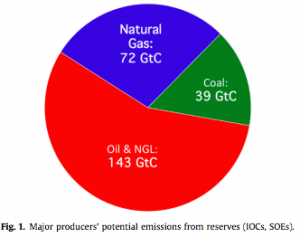A new study is raising doubts about future development of new fossil fuel resources. Published in Global Environmental Change and authored by Richard Heede and Naomi Oreskes, the report looks closely at the potential of global warming emissions that could be unleashed from carbon reserves held by the globe’s largest fossil fuel producers.
 Some key findings of the study include:
Some key findings of the study include:
- Burning the reserves of the world’s largest fossil fuel producers will result in emissions of 440 gigatons of carbon—far in excess of the 275 gigatons of carbon scientists say can be emitted this century if global mean temperature increases are to stay at or below 2 degrees Celsius.
- The future emissions from the proven reserves of the largest 28 state-owned entities, including the National Iranian Oil Company, Saudi Aramco and Russia’s Gazprom, collectively make up more than three quarters (76 percent) of the world’s remaining carbon budget.
- The future emissions from the proven reserves of the largest 42 investor-owned companies collectively make up 16 percent of the world’s remaining carbon budget.
Funded in part by the Union of Concerned Scientists (UCS) also found that “profound risk” to the climate exists from the prospect of development of these reserves.
“This study shows just how important it is that the world reaches a strong international climate agreement in Paris next month,” said Alden Meyer, the director of strategy and policy at UCS who has been involved in the climate negotiations for 25 years. “The fact is, Russia, Iran, Saudi Arabia and other oil producing counties are continuing to ramp up production, despite the threat climate change poses to communities around the world.”
The study shows the reserves of most of the 42 investor-owned companies will be exhausted in 15 years or less. But oil and gas companies are investing hundreds of billions of dollars to explore for and develop new reserves to extend production in the decades to come. Heede says the threat of exceeding the 2 degree Celsius target comes primarily from the investor-owned companies tapping new reserves and he states the study’s findings can help inform shareholder action.
“The threat of exceeding the 2 degree Celsius target comes primarily from the investor-owned companies tapping new reserves, less so from their relatively small existing reserves,” said Heede, the principal of Climate Mitigation Services.
Oreskes, a Harvard history of science professor and former exploration geologist, added, “The bottom line is that if we’re to have any hope of avoiding a 2 degree temperature increase, the largest state-owned companies cannot fully tap all of their proven reserves and the big investor-owned companies need to decrease rapidly, and ultimately eliminate, their capital expenditures for exploration and development of new reserves.”

